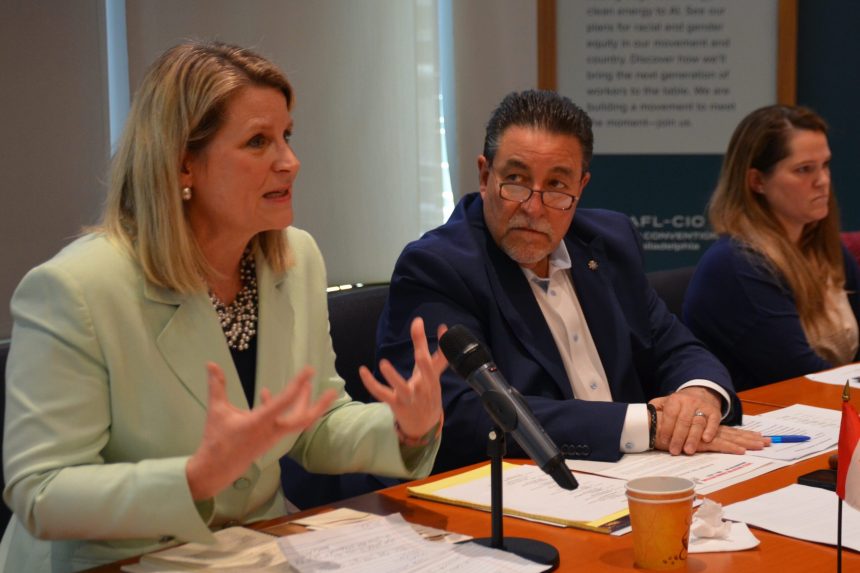AFL-CIO President Liz Shuler is realistic about the challenges facing the labor movement – and she’s also determined to help lead a strong recovery as the federation battles against a number of recent anti-worker developments.
Shuler spoke to the Maritime Trades Department Executive Board May 7 at AFL-CIO headquarters, located in the nation’s capital. She thanked MTD President David Heindel for his leadership and reiterated the federation’s unwavering support for the U.S. Merchant Marine.
“The attacks on the Jones Act are constant, and I’m so glad to work with Dave and all of you to really keep that front and center and educate people,” Shuler stated. “I feel like we’re always behind the curve when these attacks come – that people have a knowledge deficit, and we wring our hands and say, how could they do this? Well, mostly it’s because we have a lot of people that are retiring. We have turnover on the Hill, and it’s this constant education. But we’re going to fiercely defend the Jones Act with everything we have, at all times, because it’s bedrock. It is a fundamental right that that we will fiercely stand by as a labor movement.”
She also commended the MTD and its affiliates for their work promoting the SHIPS for America Act, which is considered the most comprehensive maritime revitalization legislation in more than half a century.
Shuler pointed to the MTD’s decades of solidarity as a guide for overcoming current challenges.
“Solidarity is a word that really means something with the Maritime Trades,” she said. “You show up. You show up for those who aren’t even necessarily adjacent to your industry…. The OPEIU was born out of the solidarity you showed. In the 1960s and 1970s, when the public sector was trying to organize, you showed up…. We could use that solidarity more than ever.”
The federation president described some recent executive orders as “a full-frontal assault on our labor movement writ large. With the stroke of a pen, eliminating collective bargaining rights for federal union members…. It is the biggest attack on our labor movement in our history. People like to point back to PATCO, the air traffic controllers, which was a moment in time that was seminal. This is that moment on steroids.”
She continued, “No matter what industry you’re in, there’s an executive order for you, and it’s coming a mile a minute. But we’ve been here before. The labor movement endures. It’s a matter of the fierceness and the speed we probably haven’t dealt with before, but we have definitely been here before and gone through hard times and come back stronger. So that’s our objective. We’re going to continue to organize. We’re going to continue to fight back, make our voices heard.”
Shuler has been traveling across the country, mobilizing for various grassroots outreach. Among other messages, she has used the meetings and rallies to promote the AFL-CIO’s Department of People Who Work for a Living – a resource aimed at countering misinformation from the so-called Department of Government Efficiency (DOGE).
In starting the mobilization, “we said, we’ll tell you from our perspective what efficiency looks like, but we also use it as a platform to show the impacts of what these (DOGE) cuts look like on real people. The hearings we did were all across the country, and mainly purple districts…. We invited workers to come in and testify, and we invited small-business people. We invited farmers, we invited veterans to talk about what these cuts mean. And it was so compelling.”
A lifelong trade unionist and longtime backer of the SIU, Shuler said that during her travels, “What I heard was that people want common sense. No matter if you’re Democrat, Independent, Republican, people want common sense. And what they’re starting to see (from the administration) is not that.”
She pointed out that income disparity remains a significant issue in the U.S. For example, a CEO rakes in an average of 238 times more money than a worker at their company.
Shuler also said the many people who attended those meetings expressed fear about potential cuts to Social Security and Medicaid.
“It’s up to us as a labor movement to be that place where you connect that anger and that frustration to action,” Shuler said. “Now is our time, and unions have never been more popular…. We have a real opportunity for organizing and to continue to stay on that front foot.”
During a question-and-answer session at the MTD meeting, Shuler pointed out that the labor movement, through its state federations and central labor councils, has “a unique infrastructure. We can activate people in pretty much every town and city across this country and reach real working people all across this country on a moment’s notice. But if we’re not all using those hubs, then we’re less effective.”
Moreover, Shuler said that the AFL-CIO is planning additional outreach centered around Labor Day.
“That’s when everybody is paying attention to labor,” she noted. “We are planning, with all of you, to make this a Labor Day like no other. We want it to be different this year. We want it to be action-focused.”

